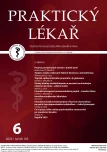-
Medical journals
- Career
Intoxication from Wall germander (Teucrium chamaedrys) after consuming a tea after recommendation from herbalist – risks of phytotherapy
Authors: A. Uličný 1; M. Běhounková 1; O. Semerád 2
Authors‘ workplace: Klinika pracovního lékařství 1. LF UK a VFN, Praha Toxikologické informační středisko Vedoucí: prof. MUDr. Sergej Zacharov, Ph. D. 1; Fakultní Thomayerova nemocnice, Praha Interní klinika 3. LF UK a FTN Vedoucí: doc. MUDr. Pavel Kohout, Ph. D 2
Published in: Prakt. Lék. 2023; 103(6): 311-313
Category: Case Report
Overview
Phytotherapy, the treatment of diseases with herbal remedies, is becoming increasingly popular. The therapeutic effectand toxicity of herbal mixture is often dependent on the amount of active ingredients and the ingested dose. One of therepresentatives of these medicinal herbs is Wall germander (Teucrium chamaedrys). This plant has a long tradition infolk medicine, contains a whole spectrum of natural substances, which are biologically active, have antioxidant,antimicrobial, antitumor and anti-inflammatory effect. Due to high number of intoxications in European Union, studieswere performed and demonstrated, that this species has also hepatotoxic effect due to the presence of neo-clerodanediterpenoids teucrin A especially. Due to incidence of severe intoxications in Europe some countries of the European Union banned the sale and use of preparations containing germander. In the Czech Republic is the sale of food supplements and preparations from Germander not regulated, these products are freely available on the internet in form of tinctures and capsules.
Keywords:
intoxication – case report – phytotherapy – Teucrium chamaedrys – hepatotoxicity – teucrin A
Sources
- Bosisio E, Giavarini F, Dell’Agli M, et al. Analysis by high-performance liquid chromatography of teucrin A in beverages flavoured with an extract ofTeucrium chamaedrys L. Food Addit Contam 2004; 21(5): 407–414.
- Candela RG, Rosselli S, Bruno M, Fontana G. A review of the phytochemiostry, traditional uses and biological activities of the essential oils of genus Teucrium. Planta Med 2021; 87(6): 432–479.
- European commission. Opinion of the Scientific Comitte on Food on Teucrin A, major component of hydroalcoholic extracts of Teucrium chamaedrys (Wild germander) 2003 [online]. Dostupné z: https://food.ec.europa.eu/system/files/2020-12/ sci-com_scf_out173_en.pdf [cit. 2023-12-07].
- Frezza C, Venditti A, Matrone G, et al. Iridoid gykosides and polyphenolic compounds from Teucrium chamaedrys L. Nat Prod Res 2018; 171(13): 1583–1589.
- Kouzi SA, McMurtry RJ, Nelson SD. Hepatotoxicity of germander (Teucrium chamaedrys L.) and one of its constituent neoclerodanediterpenes teucrin A in the mouse. Chem Res Toxicol 1994; 7(6): 850–856.
- Laliberté L, Villeneuve JP. Hepatitis after the use of germander, a herbal remedy. CMAJ 1996; 154(11): 1689–1692.
- Larrey D, Vial T, Pauwels A, et al. Hepatitis after germander (Teucrium chamaedrys) administration: another instance of herbal medicine hepatotoxicity. Ann Intern Med 1992; 117(2): 129–132.
- Piccolella S, Scognamiglio M, D’Abrosca B, et al. Chemical fractionation joint to in-mixture NMR analysis for avoiding thehepatotoxicity of Teucrium chamaedrys L. subsp. chamaedrys. Biomolecules 2021; 11(5): 690.
- Roede R., Stewart B, Petersen D. Hepatotoxicity of reactive aldehydes. In: McQueen CA (Ed.). Comprehensive Toxicology.Amsterdam: Elsevier Science 2010; 581–594.
-
adresa pro korespondenci:
PharmDr. Andrej Uličný
Klinika pracovního lékařství 1. LF UK a VFN
Toxikologické informační středisko
Na Bojišti 1, 120 00 Praha 2
e-mail: andrej.ulicny@vfn.cz
Labels
General practitioner for children and adolescents General practitioner for adults
Article was published inGeneral Practitioner

2023 Issue 6-
All articles in this issue
- Manifestations of blistering diseases in the oral cavity
- The analysis of the relationship between dementia and atherosclerosis risk factors
- Topical application of a medicinal preparation with β-glucan
- Changes in metallothionein levels in patients with malignant prostate cancer – a pilot study
- Oral xenogenic immunomodulating peptide – transfer factor
- Intoxication by Cherry Laurel
- Intoxication from Wall germander (Teucrium chamaedrys) after consuming a tea after recommendation from herbalist – risks of phytotherapy
- Co zvyšuje riziko vzniku psychotického onemocnění po zneužívání kanabis
- General Practitioner
- Journal archive
- Current issue
- Online only
- About the journal
Most read in this issue- Manifestations of blistering diseases in the oral cavity
- Intoxication by Cherry Laurel
- The analysis of the relationship between dementia and atherosclerosis risk factors
- Intoxication from Wall germander (Teucrium chamaedrys) after consuming a tea after recommendation from herbalist – risks of phytotherapy
Login#ADS_BOTTOM_SCRIPTS#Forgotten passwordEnter the email address that you registered with. We will send you instructions on how to set a new password.
- Career

